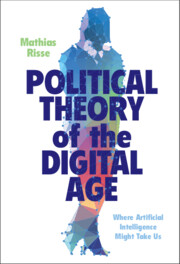Book contents
- Political Theory of the Digital Age
- Political Theory of the Digital Age
- Copyright page
- Dedication
- Contents
- Preface
- Acknowledgments
- 1 Introduction
- 2 Learning from the Amish
- 3 Artificial Intelligence and the Past, Present, and Future of Democracy
- 4 Truth Will Not Set You Free: Is There a Right to It Anyway?
- 5 Knowing and Being Known
- 6 Beyond Porn and Discreditation
- 7 The Fourth Generation of Human Rights: Epistemic Rights in Life 2.0 and Life 3.0
- 8 On Surveillance Capitalism, Instrumentarian Power, and Social Physics
- 9 Data as Social Facts: Distributive Justice Meets Big Data
- 10 God, Golem, and Gadget Worshippers: Meaning of Life in the Digital Age
- 11 Moral Status and Political Membership: Toward a Political Theory for Life 3.0
- Epilogue
- Bibliography
- Index
3 - Artificial Intelligence and the Past, Present, and Future of Democracy
Published online by Cambridge University Press: 02 February 2023
- Political Theory of the Digital Age
- Political Theory of the Digital Age
- Copyright page
- Dedication
- Contents
- Preface
- Acknowledgments
- 1 Introduction
- 2 Learning from the Amish
- 3 Artificial Intelligence and the Past, Present, and Future of Democracy
- 4 Truth Will Not Set You Free: Is There a Right to It Anyway?
- 5 Knowing and Being Known
- 6 Beyond Porn and Discreditation
- 7 The Fourth Generation of Human Rights: Epistemic Rights in Life 2.0 and Life 3.0
- 8 On Surveillance Capitalism, Instrumentarian Power, and Social Physics
- 9 Data as Social Facts: Distributive Justice Meets Big Data
- 10 God, Golem, and Gadget Worshippers: Meaning of Life in the Digital Age
- 11 Moral Status and Political Membership: Toward a Political Theory for Life 3.0
- Epilogue
- Bibliography
- Index
Summary
Modern democracies involve structures for collective choice that periodically empower relatively few people to steer the social direction for everybody. As in all forms of governance, technology shapes how this unfolds. Political theorists have typically treated democracy as an ideal or an institutional framework, instead of considering its materiality, the manner in which democratic possibilities are to some extent shaped by the objects needed to implement them. Specialized AI changes the materiality of democracy, not just in the sense that independently given actors now deploy different tools. AI changes how collective decision-making unfolds and what its human participants are like. This chapter reflects on the past, present, and future of democracy and embeds into these basic reflections an exploration of the challenges and promises of AI for democracy in this digital century. We explore specifically how to design AI to harness the public sphere, political power, and economic power for democratic purposes. Thereby, this chapter also continues the discussion from Chapter 2 by developing how technology is political in the foundational sense. This chapter also investigates current questions about how AI could threaten or enrich the democratic processes of the present.
- Type
- Chapter
- Information
- Political Theory of the Digital AgeWhere Artificial Intelligence Might Take Us, pp. 47 - 72Publisher: Cambridge University PressPrint publication year: 2023

